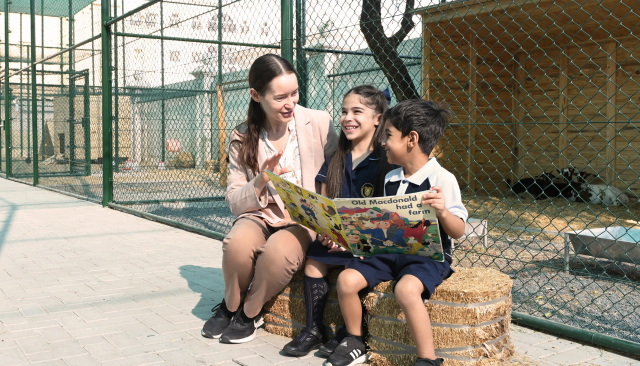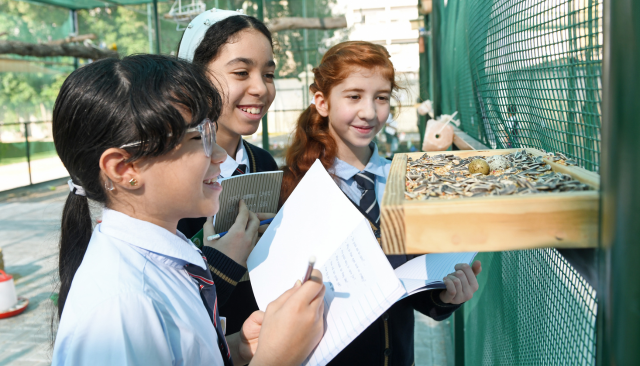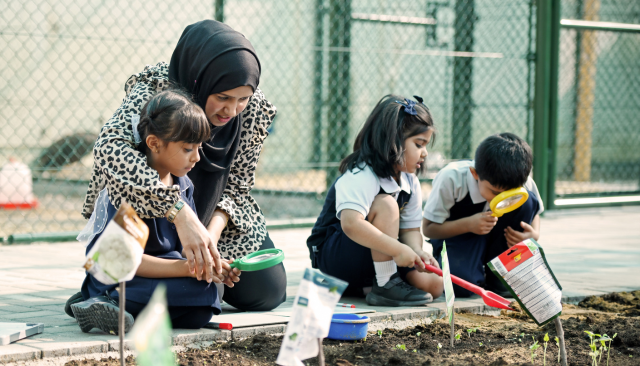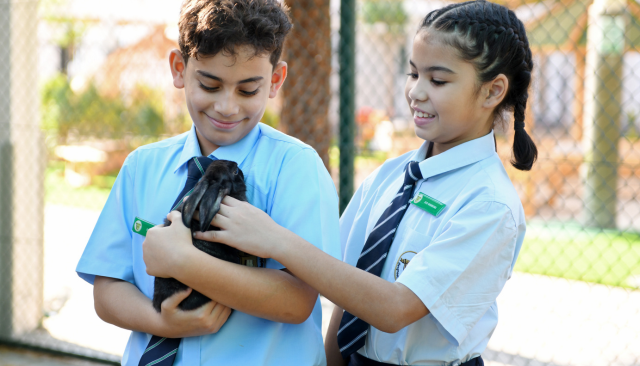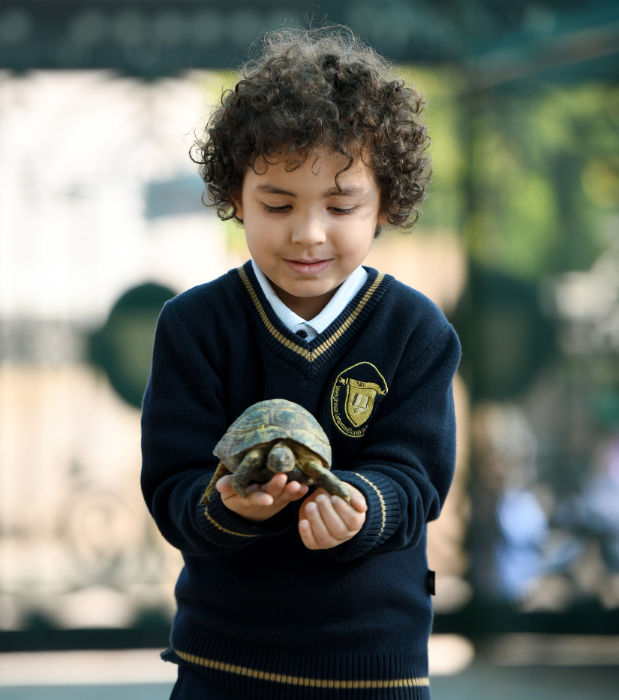
How the Forest and Farm Experience Boosts Student Wellbeing
The integration of a forest school and farm into our educational environment offers a unique opportunity to enhance the overall wellbeing of students in several key ways:
- Natural exploration: In a culture where children have limited engagement with the natural world due to the hot climate, a forest school approach and a farm provide children with new experiences and exposure to nature. Additionally, a forest school fosters engagement in physical activity and facilitates social and emotional development, which has a positive impact on the overall wellbeing of students. Connection with nature fosters a sense of connection with the natural world that can lead to improved mental wellbeing and increased appreciation for the environment.
- Active outdoors: Engaging in outdoor activities like exploring nature trails, working on the farm, and participating in outdoor games encourages students to be physically active. Regular physical activity can improve physical fitness, boost mood, and increase overall energy levels.
- Practical learning: Forest schools and farms provide hands-on learning opportunities where students can engage in real-life experiences. This type of learning can improve cognitive skills, problem-solving abilities, and critical thinking as students actively participate in projects related to farming, gardening, and the natural environment. Forest schools and farms often promote cooperative learning and social interactions among students. Working together in outdoor environments can enhance communication skills, teamwork, and empathy.
- Eco-ambassadors: Exposure to animals on farms can teach students compassion, responsibility, and respect for all living beings. Being involved in farming and nature-related activities can instill a sense of environmental responsibility and encourage students to adopt sustainable practices. This can include learning about organic farming methods, composting, recycling, and reducing waste, empowering students to become environmentally conscious individuals.
Outdoor Learning Revolution
Outdoor learning is an experiential approach to education. Our forest school and farm provide hands-on, student-led, experiential learning opportunities that require children to engage actively in the learning process. Students observe and interact with their natural surroundings, gaining a deeper understanding of concepts through direct experiences.
Active, experiential, child-led learning stimulates curiosity, critical thinking, and problem-solving skills. By immersing students in natural environments, outdoor learning experiences in a forest school and farm foster a profound connection with the natural world.
Students have cross-curricular and holistic learning opportunities, linking various subjects, including language, science, math, and creativity, engaging all their senses.
Additionally, there is a positive impact on mental and physical health, which can lead to improved academic achievement. The forest school and farm offer authentic contexts for learning that closely resemble real-life situations, allowing students to directly apply their knowledge and skills to solve real-world problems.
Farm Life's Impact on Students' Emotional Growth
We have goats, rabbits, tortoises, ground pigeons, hens, and a variety of exotic birds, including cockatiels, finches, and majestic peacocks at our farm. A school farm inculcates a sense of responsibility in children, encouraging awareness of animals and their needs, developing a sense of responsibility, and accountability for their actions. The sense of purpose and responsibility can extend beyond the farm and positively impact social and emotional development.
A school farm and forest require children to participate in various tasks like planting, harvesting, and caring for animals. These collaborative activities promote teamwork, collaboration, and social skills. Nurturing farm animals fosters empathy, compassion, and an understanding of the interconnectedness of all living beings. A school farm offers a tangible and visible way for students to see the results of their hard work, which can be incredibly gratifying and result in a sense of accomplishment and enhanced self-esteem.
These experiences and skills learned on the farm can have long-lasting positive impacts on students' emotional and social abilities.
Integrating Animal and Plant Care into Education
By integrating the care of animals and plants into the early years' curriculum through observation, hands-on activities, literature, reflection, and real-world experiences, students can develop a sense of responsibility and empathy. These experiences pave the way for a lifelong appreciation of the natural world and a compassionate attitude towards all living beings. This holistic approach to education not only fosters empathy but also encourages active participation in the wellbeing of animals and plants, as evident in the following five key strategies:
- Observe and Interact: Encourage students to observe and interact with animals and plants, providing opportunities for them to watch animals, study their behaviors, and learn about different plant species. This can create a sense of connection and empathy towards living creatures.
- Establish a Routine: Develop a routine for students to participate in the care of animals and plants. Assign specific tasks like feeding animals, watering plants, or planting seeds.
- Ensure that tasks are age-appropriate and safe for young learners. Repeating these responsibilities regularly helps students develop a sense of duty and accountability.
- Collaborative Projects: Plan collaborative projects that involve students working together to care for animals and plants. For example, they can design and create an animal habitat, build a garden, or create a small pond for aquatic life. These projects encourage teamwork, cooperation, and shared responsibility, fostering empathy and a sense of community.
- Storytelling and Empathy: Introduce children's books and stories that highlight animal and plant care, compassion, and empathy. Discuss the characters' actions and emotions, emphasising the importance of understanding and showing kindness towards living beings. Storytelling can help children connect with the characters, improve language and literacy, and develop empathy towards animals and plants.
- Reflection and Discussion: Provide opportunities for students to reflect on their interactions with animals and plants. Engage them in group discussions to share their experiences, thoughts, and feelings. Encourage them to talk about their observations, challenges, and successes. Reflection and discussion help children develop a deeper understanding of their responsibilities and the impact of their actions.
Impact of Forest and Farm Activities on Students' Health
To measure the improvement in students' physical health and fitness due to their activities in the forest school and farm, we can conduct periodic physical assessments. We can also consider parents' feedback and conduct parent surveys. At school, we can regularly observe students during their activities in the forest school and farm to record their engagement levels, participation, and changes in physical performance. Document any notable improvements in their physical abilities, coordination, balance, or stamina. We can track their wellbeing and involvement using Ferre Laevers' 'Leuven’s Scale.' Improved physical health and wellness will have a direct correlation with improved academic achievement.
Outdoor Classrooms of Tomorrow
Our forest school and farm setting is an enabling, experience-rich outdoor classroom that provides essential natural, hands-on learning experiences. We use natural materials like tree trunks for seating, tailored turf with built-in hills to climb up and slide down, fostering gross motor development. Trees and plants offer crucial exposure to nature, encouraging awareness, appreciation, and care for the natural world. We have a sand pit and a mud kitchen for sensory, messy play experiences, as well as natural cane teepees to facilitate role-play or create a quiet, cozy corner within the environment. By establishing this outdoor, enabling environment, students can experience immersive and interactive learning opportunities that foster a connection with nature and enhance their overall educational experience.
Parents and the Community Join Forces for a Sustainable Future
We have just embarked on our forest school journey. Once fully established, we do intend to involve our parents through volunteering opportunities, workshops, and training on subjects related to sustainable farming practices, nature conservation, or outdoor education. This will help build their knowledge and skills while actively involving them in the development of the school. We will host community events such as open days, farmers' markets, or cultural festivals within the school premises. These events will provide opportunities for parents, students, and the community to come together, showcase their talents, and contribute to the vibrant atmosphere of the school.
The involvement of parents and the community will provide additional human resources, ideas, skills, and expertise, which can contribute to the success and sustainability of the school and its projects. It will also foster a sense of ownership and pride in the school, resulting in stronger support and commitment from the parents. Through engagement with the forest school and farm, parents, students, and community members will develop a deeper appreciation and understanding of the environment, leading to positive environmental stewardship.
Eco-Education at its Best
The forest school and farm serve as an enabling environment, essentially functioning as a living laboratory for students to explore, learn, and actively engage in sustainable farming practices and environmental conservation. These experiences cultivate a deeper connection with nature, instill a profound sense of responsibility toward the environment, and empower students to evolve into environmentally conscious individuals. The forest school and farm will offer a wide range of experiences, including:
- Farming and gardening activities
- Animal care
- Nature walks and observations
- Wildlife conservation awareness
- Environmental consciousness
- A holistic approach to the curriculum
This unique educational setting promises to be an inspiring and enriching place for students to not only learn about the environment but also become active stewards of our planet.
Forest and Farm Activities Bridge the Gap Between Subjects
By fostering cross-curricular connections, students can witness the real-world applications of various subjects, develop critical thinking skills, and acquire a holistic understanding of the world around them. This approach encourages them to recognise the interconnectedness of knowledge and promotes a well-rounded education.
Incorporating STEAM (Science, Technology, Engineering, Arts, and Mathematics) principles within the farm and forest school setting allows for hands-on experiments related to plant growth, soil composition, and environmental factors. For example, students can plant and compare the growth of various plants, investigating the influence of sunlight on vegetation. They can measure and record data on aspects such as tree height, planting bed perimeter, or irrigation system water volume. Students in Nature Art can observe the natural surroundings and create artwork that reflects their experiences. Activities may include creating nature journals, sketching what they see, and crafting models of the animals they encounter.
In the realm of Language, Communication, and Literacy, we encourage students to observe, draw, describe, and write about their experiences in the forest school and on the farm. They can craft pieces inspired by their outdoor adventures or even pen stories set in the forest or on the farm. Additionally, children can explore the cultural aspects of sustainable farming practices across the UAE, delving into traditional farming techniques. They can connect with local communities to learn about their relationship with the land, traditional farming practices, and environmental conservation methods. This engagement fosters cultural understanding and an appreciation for diverse perspectives.
Age-Appropriate Adventures: Tailoring Learning for All
Adapting outdoor learning experiences to different age groups within the forest school and farm environment is a complex task that necessitates careful consideration of the developmental stages, interests, and capabilities of each age group. Our forest school and farm learning programme offers two distinct approaches: skills-based and play-based learning opportunities, which are designed to accommodate a wide range of age groups.
The play-based curriculum forms the foundation for all learning activities and is influenced by the principles of the play continuum. This approach ensures that learning is engaging, enjoyable, and relevant to learners of all ages.
In the forest school curriculum for older children, the focus shifts towards key areas such as Fire-craft, Shelter Building, Nature and the Environment, Rope & Knot skills, Bushcraft, and Tools, with Orienteering becoming a part of the programme for upper Key Stage 2 and beyond. These topics provide real-life skills, fostering problem-solving and critical thinking abilities. It's worth noting that the national curriculum for England can also be effectively integrated into the forest school concept, allowing for a holistic, hands-on approach to learning that is both meaningful and aligned with educational standards.
Empowering Educators: Training and Workshops for Quality Forest and Farm Education
We are excited to share that we are currently collaborating with colleagues from Forest schools within the GEMS education network to develop a comprehensive training programme for our leaders and teachers. Additionally, we are exploring opportunities for a key member of our staff to undergo training with the Institute of Outdoor Learning and the Forest School Association in the UK. Our overarching goal is to promote environmental literacy among our staff, students, and the broader community.
Our commitment to this initiative extends to engaging with the community at large. We intend to collaborate with local community members to raise environmental awareness and share best practices. This will be achieved through a series of workshops and community-based events, with a special focus on involving parents. Together, we can work towards a more sustainable and environmentally conscious future.

